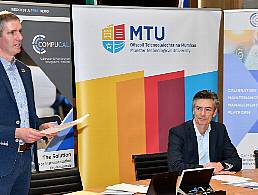How good is your memory? Have you got total recall when it comes to your colleague’s dogs’ names and medical ailments, but struggle to remember that the same colleague needed your input on a very important project, like, yesterday?
The brain is a mysterious thing and the way our memory works – or doesn’t – is no different. Those of you with good long-term memory who also happen to be regular listeners of SiliconRepublic.com’s For Tech Sake podcast will remember Dr Conor Linehan talking about how technology can manipulate our brains. Don’t worry if you don’t remember the episode; it was from last October, after all. If you want to refresh your memory, it’s available here.
Linehan, who is a psychology lecturer at University College Cork (UCC), spoke about deepfakes and how they can play havoc with our recall. He was basing his thesis on a study UCC did which involved people being shown real films and fake remakes to see if they would falsely remember the existence of the fake remakes.
The study observed an average false memory rate of 49pc, with many participants remembering the fake remake as better than the original film.
The moral of the story is you can’t trust your own brain sometimes. This can be especially frustrating if you’re under pressure to remember a lot of information in one go. For many of us, school exams were the worst – they were fine for very diligent types with good short-term memories but not so good for anyone whose brains were wired a little differently.
Luckily, there are ways to improve your memory. You can focus your energies on different exercises based on what areas of your memory you want to boost.
Here are some nifty methods to better your brain’s recall abilities.
Fun and games
Soduku, crosswords, wordsearches, chess, card games … These games are all good for your memory. Even video games have been found to boost cognitive function.
Whether you’re trying to complete a difficult level on a game or you’re scratching your head trying to figure out a cryptic crossword clue, you’re challenging your brain.
Research has found that some games, especially role-playing games (RPGs), can improve reasoning, working memory and long-term memory in older adults and young people. Just vary up the games and don’t play Fallout for 12 consecutive hours.
Build a memory palace
Sherlock Holmes called his a mind palace, but it’s all the same idea. According to The Art of Memory blog, a memory palace is like a location in your mind in which you can ‘file away’ different pieces of information.
“The mind palace technique is a method for memorising large amounts of information by placing facts into locations inside an imaginary ‘palace’ in your mind. The palace can be any space that you are familiar with, like your home, school, workplace or neighbourhood. It can even be a virtual space, like a painting, computer game or a scene that you invent yourself.”
To retrieve the information, you imagine yourself walking through the space. Every time you focus on a detail in the ‘palace’ it prompts a memory by association. For example, if you see a grandfather clock, you remember everything in your appointments diary.
We never said it was the most realistic technique, but it seemed to work wonders for Holmes.
Active recall
This simple method is great because it has precisely zero gimmicks. All you’re doing is testing yourself. Once you have familiarised yourself with whatever it is you need to remember – whether it’s exam notes or the names of your mother-in-law’s sworn enemies – you put away what you have read and attempt to recall it.
Then you return to the material and find out how well you were able to remember it all. This last step is important because it requires you to look at the material again, but for the purpose of correcting yourself.
Break it down (with a song/mnemonic)
It doesn’t work for everyone, but lots of people swear by music to help them concentrate. Tunes, lyrics and even nonsense poems or mnemonics can help us remember things.
If you have to remember a long list of scientific terms, make up a song that incorporates the words you need to know. The dafter, the better.
Memory by association
Ricardo Lieuw On has a great TED Talk on memory, where he talked about the importance of staying agile when trying to memorise information.
When he used to have to memorise things, he encouraged his brain to go as kooky as possible and he made associations between the information he had to learn and what was relevant in his life.
Find out how emerging tech trends are transforming tomorrow with our new podcast, Future Human: The Series. Listen now on Spotify, on Apple or wherever you get your podcasts.




